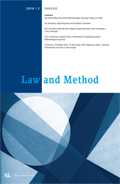|
In deze bijdrage bespreken de auteurs inhoudelijke en didactische aanknopingspunten voor de integratie van professionele ethiek in de academische juridische opleiding. Dat gaat wat de auteurs betreft verder dan (enkel) het leren van gedragsregels, maar betreft ook de (kritisch-)ethische reflectie (op de professionele rol) van de jurist en ethische oordeelsvorming. Aanknopingspunten uit rechtstheoretische en onderwijskundige literatuur vragen om een curriculum brede, stapsgewijze, inbedding met passende toetsing. Dit onderwijs dient idealiter een combinatie te zijn van afzonderlijke meta-juridische vakken over recht en ethiek, positiefrechtelijke vakken die ethische elementen bevatten, klinische training en specifieke vakken over beroeps- of professionele ethiek. In dit artikel bespreken de auteurs diverse methoden die kunnen worden gebruikt om het onderwijs vorm te geven en illustreren dit met enkele voorbeelden uit het Utrechts universitair juridisch onderwijs. Actieve participatie, reflectie en – idealiter – eigen ervaringen zijn daarbij van groot belang. Een aantal modellen uit niet-juridische disciplines kan behulpzaam zijn bij het bieden van structuur voor ethische reflectie, voor zover het morele sensitiviteit en morele oordeelsvorming stimuleert. Verscheidene toetsingselementen op het terrein van de ethiek zijn door het curriculum heen nodig. Leeractiviteiten en toetsing kunnen worden opgebouwd in het curriculum van kennis en begrip, naar competenties ten aanzien van ethische dilemma’s en moreel oordelen. |


Law and Method
About this journalSubscribe to the email alerts for this journal here to receive notifications when a new issue is at your disposal.
| Artikel |
|
| Authors | Emanuel van Dongen and Jet Tigchelaar |
| AbstractAuthor's information |
| Artikel |
|
| Keywords | legal ethics, informal respect, educational integration, importance of setting examples |
| Authors | Hendrik Kaptein |
| AbstractAuthor's information |
|
Legal ethics may be taught indirectly, given resistance to ethics as a separate and presumably merely subjective subject. This may be done by stressing the importance of facts (as the vast majority of legal issues relate to contested facts), of professional role consciousness and of the importance of formal and informal respect for all concerned. This indirect approach is best integrated into the whole of the legal curriculum, in moot practices and legal clinics offering perceptions of the administration of legal justice from receiving ends as well. Basic knowledge of forensic sciences, argumentation and rhetoric may do good here as well. Teachers of law are to set an example in their professional (and general) conduct. |

 Issue 12
Issue 12